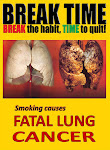
Here are some fast facts that paint a bad picture in the Philippines:
• 10 Filipinos die by the hour due to tobacco-related diseases or that is 1 Filipino dying every 6 minutes.
• According to the 2003 National Nutrition and Health Survey by the Food and Nutrition Research Institute of the Department of Science and Technology, 34.8% of adults are current smokers, of which 56.3 are males and 8.6% are females.
• The 2007 Philippine Global Youth Tobacco Survey reported that 22% teenagers currently smoke and that 1 in 5 students aged 13 – 15 smoke. This reflects and increase of 30% over the past 2 years.
• 1/3 of the population is at risk of dying from debilitating diseases and painful deaths due to tobacco use.
• The average Filipino spends approximately 2.6% of the household income on tobacco or an equivalent of PhP144 a month.
• Health costs of approximately PhP 288 Billion are spent annually on 4 tobacco-related diseases – cardiovascular diseases, chronic obstructive pulmonary diseases, cancer and diabetes.
• In 2003, the Philippines enacted Republic Act (RA) 9211 aimed to: promote smoke-free areas; inform public of the health risks of tobacco use; ban all tobacco advertisement and sponsorship and restrict promotions; regulate labelling of tobacco products; and protect the youth from being initiated to smoking.
• However, the unabated increase in smoking among adolescents and adults reflect weaknesses in the implementation of RA 9211.
---
Photo from Friendster
• 10 Filipinos die by the hour due to tobacco-related diseases or that is 1 Filipino dying every 6 minutes.
• According to the 2003 National Nutrition and Health Survey by the Food and Nutrition Research Institute of the Department of Science and Technology, 34.8% of adults are current smokers, of which 56.3 are males and 8.6% are females.
• The 2007 Philippine Global Youth Tobacco Survey reported that 22% teenagers currently smoke and that 1 in 5 students aged 13 – 15 smoke. This reflects and increase of 30% over the past 2 years.
• 1/3 of the population is at risk of dying from debilitating diseases and painful deaths due to tobacco use.
• The average Filipino spends approximately 2.6% of the household income on tobacco or an equivalent of PhP144 a month.
• Health costs of approximately PhP 288 Billion are spent annually on 4 tobacco-related diseases – cardiovascular diseases, chronic obstructive pulmonary diseases, cancer and diabetes.
• In 2003, the Philippines enacted Republic Act (RA) 9211 aimed to: promote smoke-free areas; inform public of the health risks of tobacco use; ban all tobacco advertisement and sponsorship and restrict promotions; regulate labelling of tobacco products; and protect the youth from being initiated to smoking.
• However, the unabated increase in smoking among adolescents and adults reflect weaknesses in the implementation of RA 9211.
---
Photo from Friendster






